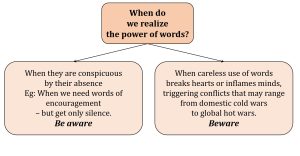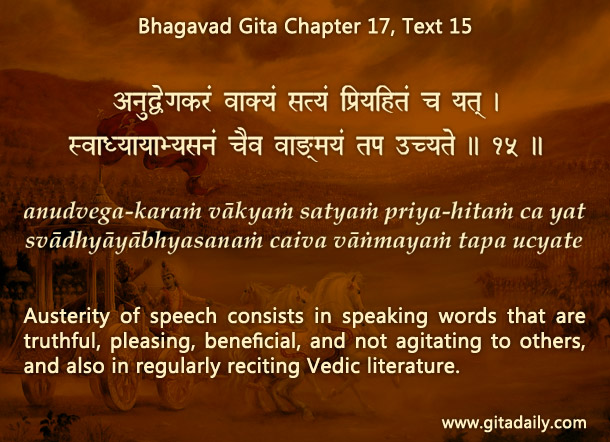 When we use something regularly, we may forget how powerful it is. Consider electricity. As it is widely available, we tend to forget its importance — till the power grid goes down and we are plunged into darkness and cold. Similarly, we may overlook its hazards: electricity can kill within minutes.
When we use something regularly, we may forget how powerful it is. Consider electricity. As it is widely available, we tend to forget its importance — till the power grid goes down and we are plunged into darkness and cold. Similarly, we may overlook its hazards: electricity can kill within minutes.
What applies to electricity applies also to words. Let’s see how.
The importance of words: Just as we may forget the importance of electricity due to its ubiquity, so may we forget the importance of words. Only when they are conspicuous by their absence do we realize their critical importance. Suppose we felt dejected, rejected, confounded — and in desperate need for a few kind words of encouragement. If all we got at such times was a cold silence, we would have realized the irreplaceable value of words. Given that words have the capacity to convey both warmth and light, they can change a person’s mood, mindset and even their life. Indeed, words can inspire transformation — individually, socially, globally.
The danger of words: Just as careless handling of electricity can be dangerous, so can careless use of words. Such speech can break hearts, enrage minds and trigger conflicts. While we would normally do everything we can to prevent anyone from getting electric shocks by our negligence of insulation on our power lines, we are not so cautious about preventing verbal shocks caused by our thoughtless words. Far from such caution, we may indulge in self-congratulation, patting ourselves on our back for our cleverness in roasting others with harsh words, sarcastic comments or insulting putdowns. Little do we realize how we are playing with fire: whereas people shocked by electricity generally freeze and fall, people shocked by words can become so furious as to start face-offs which may range from domestic cold wars to global hot wars.
When we thus become aware of the enormous and dangerous power of speech, we can better appreciate the Bhagavad-gita guideline (17.15) to discipline our speech.
One-sentence summary:
Words shape worlds — watch your words.
Think it over:
- Why may we overlook the power of words? Explain with an example.
- Note any one occasion when the absence of words made you realize their power.
- Note any one occasion when you realized the danger of carelessly spoken words.
***
17.15: Austerity of speech consists in speaking words that are truthful, pleasing, beneficial, and not agitating to others, and also in regularly reciting Vedic literature.
To know more about this verse, please click on the image


MIND molds the MOUTH
Haribol